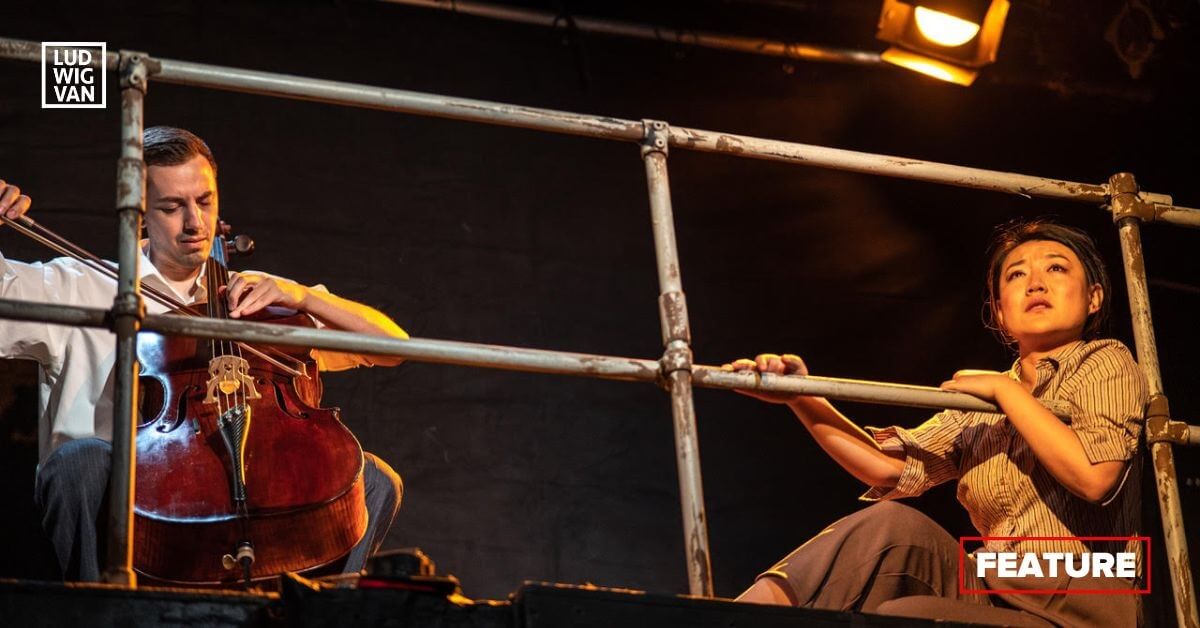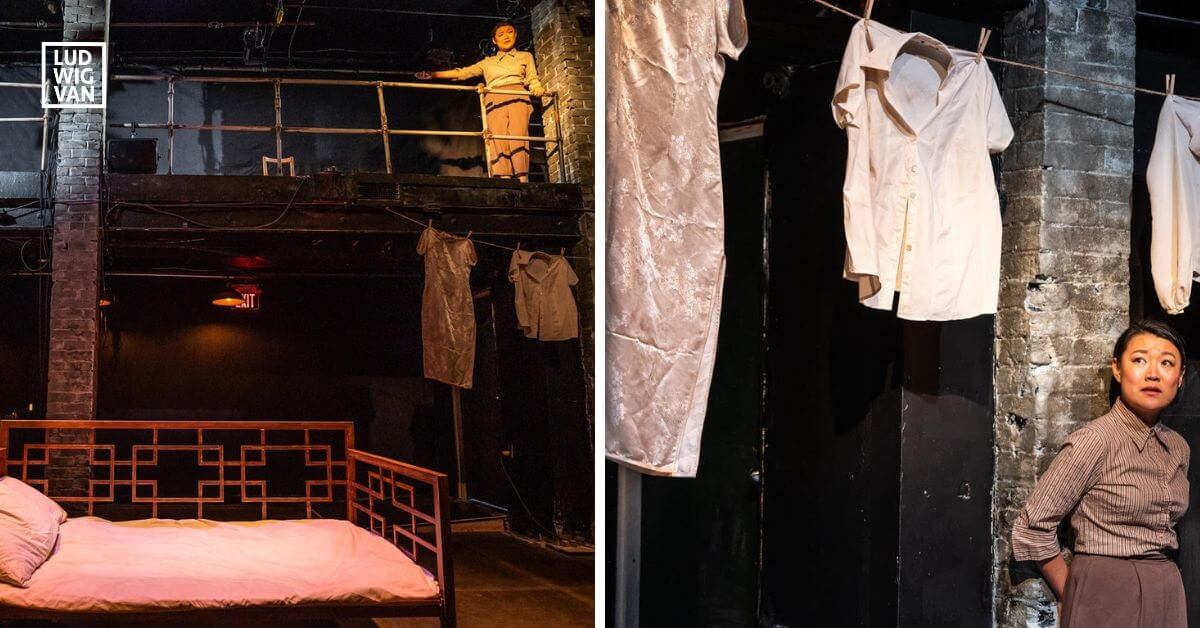
Theatre Passe Muraille & Music Picnic/ The Year of the Cello, written and directed by Marjorie Chan, music composed by Njo Kong Kie, Oct. 15 to 29. Tickets here.
Theatre Passe Muraille’s opening post-pandemic production is a two-hander for one actor (Rong Fu) and a cellist (Bryan Holt and Brendan Rogers at alternate performances). At the heart of the story is a lesbian relationship set in Hong Kong in 1929, but the storyteller relates what happened to the couple many years later.
Music is not just a cinematic background here. Rather, co-creators Marjorie Chan and Njo Kong Kie have created a dialogue between the text and music that is a symbiotic unity.
According to the co-creators, they met first over 20 years ago at a Tapestry Lib-Lab, although they did not work together. Rather, they kept on bumping into each other. The more avant-garde the musical concert, the more likely that Chan and Njo would be in the audience.
What follows are highlights from my Zoom call with Chan and Njo about The Year of the Cello. Chan is a veteran writer/director and artistic director of TPM, while Njo is an acclaimed composer for film, dance, opera and theatre, and artistic director of Music Picnic

Background to the play
Apparently, Chan, who initiated the project, was inspired by the cello as an instrument — the richness of the emotions it evoked, that it could induce both sorrow and solace depending on the circumstance. She was interested in crafting a play that went inside the music, that produced a different theatrical relationship than just underscoring the text.
“This is a play about the complexity of feelings,” she says.
The cello, for Chan, represents unresolved tragedies, broken hearts, and unspoken trauma, but to attempt to write the role for the instrument was beyond her capabilities. At that point, she realized that she needed a musical collaborator and reached out to Njo.
Also pertinent to the play is the Sheung Wan district of Hong Kong. Chan got to know the place well because her sister lived there. She learned that Sheung Wan suffered terribly during an outbreak of the bubonic plague in 1929, an event which figures in The Year of the Cello.
In 2010, Chan had penned a script involving a cello, which she describes as the worst play ever written. During lockdown, when she wasn’t training squirrels in her backyard with peanuts, she had a look at the text and saw its potential for resurrection by moving the locale from Toronto to Hong Kong.
The original protagonist was a blue-haired bisexual woman called Wendy. Njo is quick to point out that that incarnation was changed very early on to a woman simply called Wen. It was also a three-person play, with Wen’s lover, Li-An, a character as well.
Says Njo, “We wanted to keep a tighter focus. If there is more than one storyteller, you start to get side plots. One storyteller means clarity. Now the music can evoke Li-An, and the cello becomes an equal partner with the actor.”
Explains Chan, “Something has gone wrong between them. Something has happened. The cello opens their hearts and expresses the fullness and beauty of what they are feeling.”
The role of music
As the duo explains, Bach’s Six Suites for Unaccompanied Cello figure prominently in the play, as if coming from a gramophone or the radio. Four carefully chosen movements from different suites are featured.
“We honour Bach’s presence with complete pieces of music, and not fragments,” explains Njo. “His impact is integral to Wen’s character and experience, and subsequently, to Li-An. The music has a function. It works together with what is happening on stage. It highlights the text and vice versa. The cello also expresses feelings — what is going on inside Wen and Li-An. Bach is the music they listen to, and which underlines their relationship.”
Chan adds, “Choosing from composed music is very difficult to do, but Kong Kie has a genius to match music to text. There are also snatches from historic recordings of popular music. Kong Kie has great theatrical skills when it comes to finding music.”
There is also a significant amount of Njo’s original music in the play. Explains Njo, “I composed a musical language, as if the cello could speak. It is the cello’s answers to Wen’s questions. It also evokes the Hong Kong that was.”
“Hong Kong becomes a real person through the music,” says Chan. “It’s a psychic place, a spiritual place, a purgatory. Someone is not happy. Wen and the cellist are working out a trauma together, and the character of Li-An becomes clearer as the play goes on. With his music, Kong Kie creates what I laughingly call Wen-World or the Cello-verse. He writes text with his music.”
And from Njo, “The instrument talks. The cello shows what music can do. It’s a power in and of itself. To quote 19th century American poet/musician Sidney Lanier: Music is love in search of a word.”
Special performance features
The in-person performances are presented in a relaxed format in order to make The Year of the Cello accessible for the visually impaired.
The post-performance run will be a digital audio-only experience created with binaural sound technology, providing a 360-degree listening experience of the play. Binaural recording establishes an immersive 3-D stereo environment experienced best through headphones.
#LUDWIGVAN
Get the daily arts news straight to your inbox.
Sign up for the Ludwig van Daily — classical music and opera in five minutes or less HERE.
- INTERVIEW | Actor Diego Matamoros Takes On Icon Walt Disney In Soulpepper Production Of Hnath Play - April 16, 2024
- SCRUTINY | Opera In Concert Shine A Light On Verdi’s Seldom Heard La Battaglia Di Legnano - April 9, 2024
- SCRUTINY | Lepage & Côté’s Hamlet Dazzles With Dance And Stagecraft Without Saying Anything New - April 5, 2024



